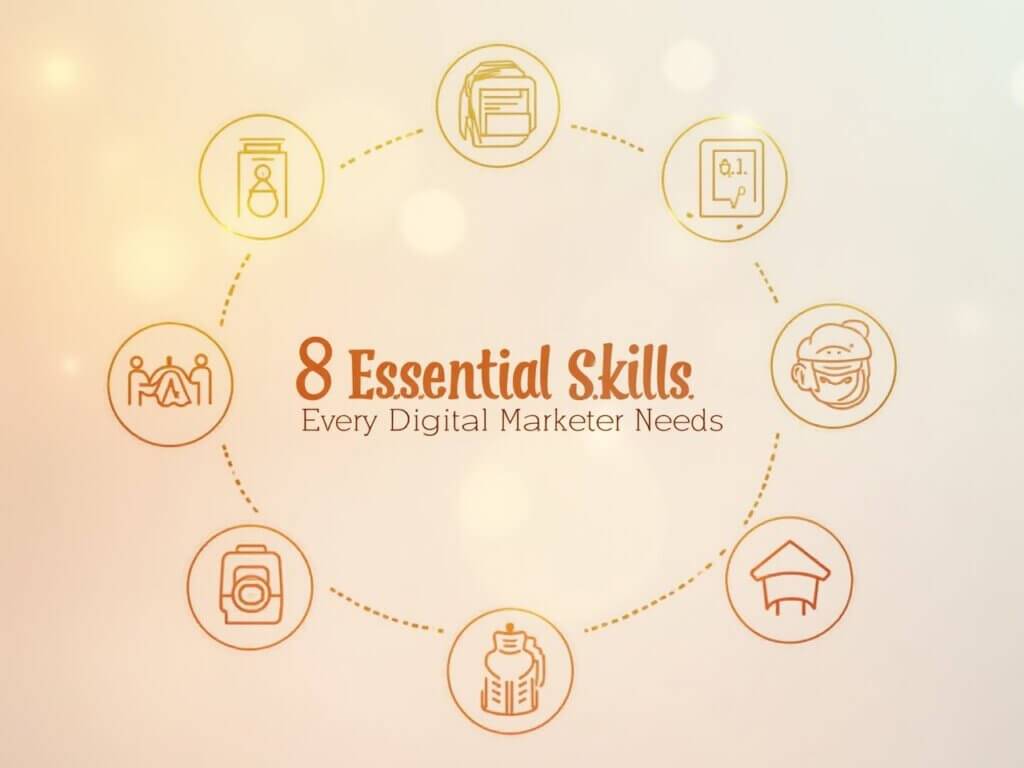The digital marketing landscape is dynamic and ever evolving, presenting both challenges and opportunities for professionals. With the rapid pace of technological advancements, particularly in Artificial Intelligence (AI), staying relevant and competitive demands a continuous commitment to upskilling. This summary condenses the eight essential skills identified as crucial for digital marketers to thrive, emphasizing their importance and practical application.
The digital industry’s vastness can be daunting, but focusing on core skills that deliver business value is key. A global demand exists for marketers with agile digital competencies, especially those proficient in AI. Epsilon’s report highlights that 94% of organizations already leverage AI in marketing, with 75% of non-users planning adoption within a year. This underscores the necessity for marketers to integrate AI into their skill sets. If you’re looking to launch or advance your career in this exciting field, exploring comprehensive Digital Marketing Training Programs can provide a significant advantage.
To advance your career, maintain up-to-date knowledge, and differentiate yourself, consider mastering these eight essential skills:
1. Video Marketing
Video’s dominance on the internet is undeniable, with daily engagement on social video content projected to continue rising. For marketers, video consistently demonstrates a positive Return on Investment (ROI), driven by metrics like views and engagement. Its effectiveness stems from its personal and relevant nature, fostering trust and versatility across platforms like Instagram and TikTok.
While not requiring full video production expertise, digital marketers should understand how to create videos without professional assistance. Popular video types include explainer videos (73%), social media videos (69%), and testimonials (60%). Tools like Camtasia, CapCut (AI-powered), Apple Final Cut Pro X, or Adobe Premiere Pro can aid in video creation and editing. Proficiency in video marketing is a perpetually valuable skill due to ongoing demand. Many of these skills are covered in our broader Digital Marketing Courses.
2. Search Engine Optimization (SEO) & Search Engine Marketing (SEM)
SEO and SEM are interconnected, leveraging search engines like Google and Bing to boost traffic and visibility. SEO focuses on optimizing websites for organic traffic, while SEM encompasses both organic and paid search strategies, including Pay-Per-Click (PPC) and programmatic advertising. Thus, SEO is a subset of the broader SEM.
Understanding the fundamentals of SEO and SEM is critical for successful digital marketing campaigns, even if technical SEO is handled by specialists. Key SEO ranking factors to focus on include:
- Keywords: Integrating relevant keywords across your website.
- Content: Creating high-quality, audience-centric content beyond just keyword stuffing.
- User Experience (UX): Ensuring fast load times, easy navigation, and relevant content to keep users engaged.
- Link Building: Prioritizing quality backlinks from reputable sites to build authority.
- Voice Search: Optimizing content for smart speakers and devices.
- Video SEO: Optimizing videos for search engines and social platforms like TikTok and YouTube.
- E-E-A-T (Experience, Expertise, Authoritativeness, Trustworthiness): While not a direct ranking factor, E-E-A-T guides Google’s assessment of content quality, influencing rankings.
Marketers should also be aware of the impact of AI on search marketing, particularly Google’s AI Overviews, which can affect brand and content visibility. Enhance your search expertise with our dedicated SEO & SEM Training programs.
3. Content Marketing
Content is the bedrock of digital marketing. Marketers must be adept at creating high-quality, SEO-friendly content across various channels and developing effective content marketing plans to engage and convert audiences.
A strategic approach involves creating content pillars – central themes relevant to your business, products, services, and values, around which all content is clustered. AI tools like ChatGPT, Claude, Google Notebook LM, and Perplexity can assist in content generation, aiding in idea crafting and draft outlining, saving time and energy while still requiring human oversight and proofreading.
Content takes many forms, including videos, social posts, emails, web content, blogs, e-books, and whitepapers. Proficiency in crafting diverse formats is beneficial. Furthermore, a firm grasp of social media marketing is essential, as content plays a crucial role on these platforms. Learn the art of compelling storytelling with our Content Marketing Courses.
4. Data & Analytics
Regardless of their specialization, all digital marketers will interact with analytics to gain insights and improve business outcomes. While monitoring and reporting via tools like Google Analytics (GA4) are straightforward, the true skill lies in interpreting this data to understand consumer behavior and apply it to strategies that boost traffic and conversions.
Businesses, even small ones, generate vast amounts of data. Marketers who can not only “read” data but also extract valuable insights to enhance future strategies are highly prized. Demonstrating innovative ways to leverage customer data for campaign success makes a marketer a valuable asset. Exploring alternatives to Google Analytics to find the best fit for specific needs is also recommended. Dive deeper into understanding user behavior with our Data & Analytics Training.
5. AI & Automation
Marketing automation has significantly advanced with AI, leading to highly intelligent and adaptive tools, including autonomous AI agents. Surveys indicate a growing adoption of AI by marketers, with 56% actively implementing and using it, and 70% expecting its increased role in their work.
As AI continues to develop, marketers can leverage automation for personalized and scalable campaigns that convert, taking over time-consuming tasks. Effective AI applications in marketing include:
- Analyzing vast datasets.
- Conducting market research.
- Automating bidding for paid ads.
- Utilizing chatbots for customer service.
- Creating triggered email campaigns.
- Using predictive analytics.
- Optimizing SEO.
- Implementing lead scoring and enhancing sales automation.
- Leveraging visual recognition for social media and e-commerce.
- Optimizing and enhancing campaigns.
- Performing measurement and adjustments.
- Creating AI digital strategies.
- Generating hyper-personalized content and recommendations.
Experimenting with AI tools like ChatGPT for various automation purposes is crucial for understanding the technology’s capabilities. Master these cutting-edge techniques with AFADMA’s specialized AI Training Courses.
6. Design Thinking & Planning
Design thinking refers to a user-centered approach to problem-solving, encouraging human-centric solutions for complex challenges. For digital marketers, understanding the four design fundamentals – color theory, imagery, typography, and composition – is vital for creating compelling websites, landing pages, and visual content.
Maintaining brand consistency through a brand style guide or template is also crucial for brand recognition. A solid understanding of design principles can significantly enhance a marketing resume, helping professionals stand out in a competitive job market. Develop your strategic and creative thinking with our Marketing Strategy Courses.
7. Social Media
With over 5.3 billion users worldwide, social media marketing is an indispensable skill for attracting, influencing, and engaging audiences. It’s more than just posting; it’s about creating relevant, targeted, and standout content that captures attention.
Marketers must understand the unique strengths of each platform and tailor content formats and messaging to specific audiences. For instance, TikTok might be ideal for a fitness brand targeting a younger demographic with dynamic video content, while LinkedIn is more suitable for B2B businesses promoting software or services to professional networks. Knowing your audience, creating resonant content, and selecting the right social platforms are paramount. Become a social media expert with our dedicated Social Media Marketing Courses.
8. Email Marketing
Email marketing remains a powerful tool, especially with the increasing importance of first-party data due to changes in cookie usage. It allows marketers to communicate directly with a captive audience and deliver personalized messages through segmentation and workflows.
According to Litmus, 44% of marketers consider email their most effective channel. Familiarity with email automation tools like MailChimp, HubSpot, and Omnisend, many of which now incorporate AI, is essential. Organizing contacts into lists for targeted messaging based on past behavior (e.g., triggered workflows for ebook downloads) is a highly effective strategy for re-engaging prospects and customers. Enhance your direct communication skills with our Email Marketing Training.
Conclusion
The relentless pace of digital marketing necessitates continuous upskilling. The eight skills outlined above are key to staying ahead and advancing your career. Staying informed about developments and trends through industry blogs, podcasts, webinars, and by following digital marketing leaders is crucial. Consider short courses or Digital Marketing Certifications to validate and demonstrate your knowledge. Above all, embrace new technologies like AI to boost productivity and enhance your capabilities as a digital marketer.
Ready to supercharge your digital marketing career? Visit the AFADMA Homepage to explore our full range of courses and start your journey towards becoming a top-tier digital marketer.




1 comment
Anthony1297
https://shorturl.fm/QxyfY